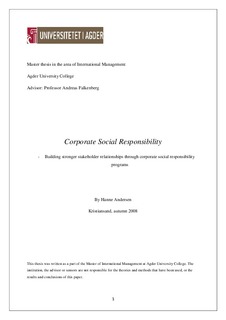| dc.description.abstract | The success of a business in today’s market is not only driven by financial values, but also by
the business’s behavior1. The triple bottom line (TBL) is an expansion of the traditional
reporting framework of accounting, where organizational and environmental issues are
included. The TBL was first phrased by John Elkington in 1994. It has later been rephrased as
the three P’s, profit, people and planet, which are meant to express the triple bottom line and
the aim for sustainability2.
After reading an article about a tragic death-accident at one of Telenor’s production sites in
Bangladesh, I was once again introduced to the term CSR. Because of the increased focus on
this accident and similar incidents, the interest for Corporate Social Responsibility has grown.
Social responsibility has in recent years received a lot of attention from many holds, the
media, managers, individuals and from the society at large.
CSR was first mentioned in the 1950s, but still it is a fairly new phenomenon and it is first in
the recent years that the term has received increased attention. I therefore believe that it is
necessary to thoroughly investigate the theories of social responsibility and other closely
related theories in the thesis. It can be hard to explain the term CSR without looking at the
similarities between this theory and the theories of Ethics and The Stakeholders Approach. In
many ways it seems like Ethics and Stakeholder Theory are of the factors that make the
foundation of CSR, and it is hard to mention one of the theories without touching at least one
of the other two theories.
Because of high global competition, businesses are forced to produce goods and services at a
lowest possible price. To fulfill this demand in the market many business activities are
outsourced to organizations worldwide. This way of doing business makes firms able to
satisfy the consumer market on both price and quality. The downside to the global business
making is the consequences of the increased production and transportation. Two of the issues
involved are environmental damage because of global warming, and large companies that are
ignoring human rights in under-developed countries because of the country’s lack of structure
and restrictions. | en |
